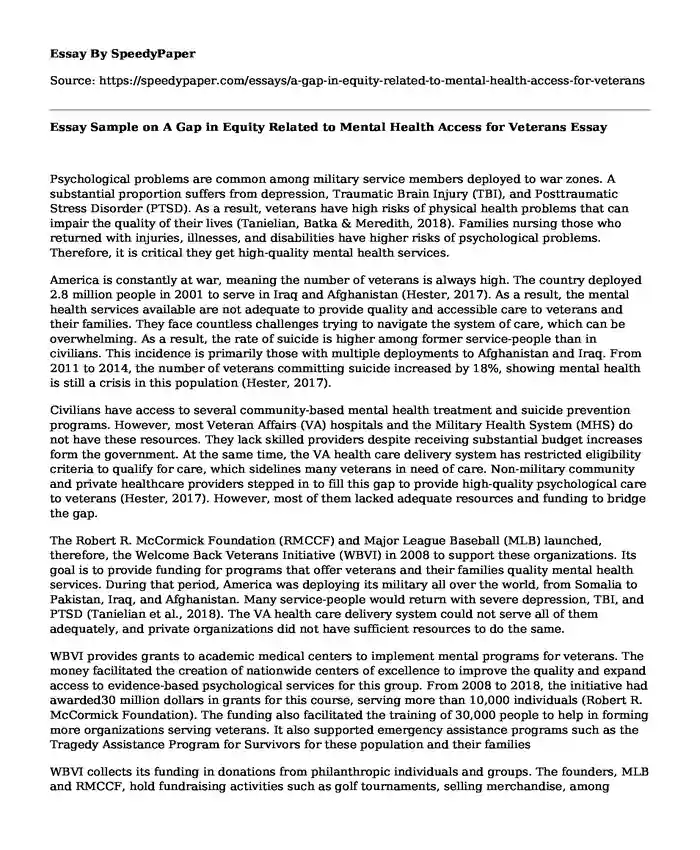
| Essay type: | Problem solution essays |
| Categories: | War Army Post traumatic stress disorder Psychological disorder |
| Pages: | 3 |
| Wordcount: | 643 words |
Psychological problems are common among military service members deployed to war zones. A substantial proportion suffers from depression, Traumatic Brain Injury (TBI), and Posttraumatic Stress Disorder (PTSD). As a result, veterans have high risks of physical health problems that can impair the quality of their lives (Tanielian, Batka & Meredith, 2018). Families nursing those who returned with injuries, illnesses, and disabilities have higher risks of psychological problems. Therefore, it is critical they get high-quality mental health services.
America is constantly at war, meaning the number of veterans is always high. The country deployed 2.8 million people in 2001 to serve in Iraq and Afghanistan (Hester, 2017). As a result, the mental health services available are not adequate to provide quality and accessible care to veterans and their families. They face countless challenges trying to navigate the system of care, which can be overwhelming. As a result, the rate of suicide is higher among former service-people than in civilians. This incidence is primarily those with multiple deployments to Afghanistan and Iraq. From 2011 to 2014, the number of veterans committing suicide increased by 18%, showing mental health is still a crisis in this population (Hester, 2017).
Civilians have access to several community-based mental health treatment and suicide prevention programs. However, most Veteran Affairs (VA) hospitals and the Military Health System (MHS) do not have these resources. They lack skilled providers despite receiving substantial budget increases form the government. At the same time, the VA health care delivery system has restricted eligibility criteria to qualify for care, which sidelines many veterans in need of care. Non-military community and private healthcare providers stepped in to fill this gap to provide high-quality psychological care to veterans (Hester, 2017). However, most of them lacked adequate resources and funding to bridge the gap.
The Robert R. McCormick Foundation (RMCCF) and Major League Baseball (MLB) launched, therefore, the Welcome Back Veterans Initiative (WBVI) in 2008 to support these organizations. Its goal is to provide funding for programs that offer veterans and their families quality mental health services. During that period, America was deploying its military all over the world, from Somalia to Pakistan, Iraq, and Afghanistan. Many service-people would return with severe depression, TBI, and PTSD (Tanielian et al., 2018). The VA health care delivery system could not serve all of them adequately, and private organizations did not have sufficient resources to do the same.
WBVI provides grants to academic medical centers to implement mental programs for veterans. The money facilitated the creation of nationwide centers of excellence to improve the quality and expand access to evidence-based psychological services for this group. From 2008 to 2018, the initiative had awarded30 million dollars in grants for this course, serving more than 10,000 individuals (Robert R. McCormick Foundation). The funding also facilitated the training of 30,000 people to help in forming more organizations serving veterans. It also supported emergency assistance programs such as the Tragedy Assistance Program for Survivors for these population and their families
WBVI collects its funding in donations from philanthropic individuals and groups. The founders, MLB and RMCCF, hold fundraising activities such as golf tournaments, selling merchandise, among others. These organizations rely mostly on the goodwill of the public, which is not always a guarantee. As a result, WBVI ended in 2008 due to a lack of funding, leaving many organizations that it was supporting stranded financially. This initiative would have continued success if it had financial support from the government.
References
Hester, R. D. (2017). Lack of access to mental health services contributes to the high suicide rates among veterans. International journal of mental health systems, 11(1), 47. Retrieved from https://www.ncbi.nlm.nih.gov/pmc/articles/PMC5563010/
Robert R. McCormick Foundation. (n.d). Celebrating Welcome Back Veterans: 2008-2018. Retrieved from https://donate.mccormickfoundation.org/wbv
Tanielian, T., Batka, C., & Meredith, L. S. (2018). Bridging gaps in mental health care: lessons learned from the Welcome Back Veterans Initiative. Rand health quarterly, 7(4). Retrieved from https://www.ncbi.nlm.nih.gov/pmc/articles/PMC6075811/
Cite this page
Essay Sample on A Gap in Equity Related to Mental Health Access for Veterans. (2023, Aug 27). Retrieved from https://speedypaper.net/essays/a-gap-in-equity-related-to-mental-health-access-for-veterans
Request Removal
If you are the original author of this essay and no longer wish to have it published on the SpeedyPaper website, please click below to request its removal:
- Essay Example about the Leading Marines Book
- Free Paper with Some Questions on Prison Management
- Karl Marx and Capitalism, Free Essay for Everyone
- Essay Example on Tet Offensive
- Paper Example on the Bombing of Hiroshima and Nagasaki
- Free Essay - Prompt Separation of Incompatible Inmates.
- Essay Sample on Role of the Berlin Wall in the Cold War
Popular categories




